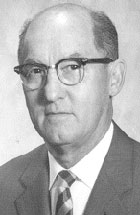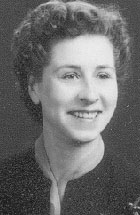 |
|||||
| College of Education Home | News & Events | Make a Gift | UW Alumni | |||||
|
November 2009 | Return to issue home
Inspired by Pair of Educators, 22 Donors Unite for Shared Cause
The first Helen and Dick Olsen scholarship was given out this past year, awarded to a College of Education student who aspires to be a future teacher. Yet what makes this scholarship truly unique is that it was provided by twenty-two different individuals. Harfield Morris “Dick” Olsen met his future wife, Helen Anderson, in Elma, Wash., where they taught at the same high school. Helen taught home economics and Dick taught high school agriculture. They were married in 1933. Throughout their lives, the Olsens were avid supporters of education. This massive group gift was donated by benefactors of the Helen and Dick Olsen estate. They grouped together and decided to create a legacy honoring the Olsens. As Dix Gedney, executor of the Olsens’ estates and one of the donors, summarized, “Lyle Olsen, one of their nephews in Montana, suggested that we group together around a scholarship for teachers. Although he hadn’t met Dick or Helen, he was a teacher and knew enough about the family to understand the importance.” Surprisingly, most of the benefactors had never met Dick or Helen in person. Though Helen was an excellent correspondent who valued family history and connections, they had never personally visited with most of their heirs. As Dix’s wife, Lael Gedney asserts, “To the vast majority, this was an unknown uncle who turned out to be wealthy. So this was an exceptional development.” Lyle’s idea of creating scholarships in the Olsens’ memory evolved into a full-fledged movement as the 22 donors banded together to create a scholarship to honor the couple. The group created one scholarship at the University of Washington, Helen’s alma mater, and one scholarship at the Montana State University agriculture department, where Dick had been a student. As a youth, Dick valued the importance of education, encouraging young people in their educational development. Raised on a farm, Dick set aside money for his college education as a teenager. He bought his own land and farmed it outside of his normal family farm responsibilities, setting the money aside so that he could get an education. Helen had a keen interest in youth education and engaged in lengthy correspondence with her mentees, written and in-person. Says Lael, “Many of her pupils kept in contact with her long after they graduated. She was very, very good about keeping in touch.” And even after they stopped teaching high school, the Olsens were very involved with education. As Dix asserts, “After they left the formal school environment, they continued to mentor youth and to work in education.” The scholarship, which will fund many future teachers through the College of Education, is truly a legacy of the Olsen’s impact. “We think that it’s a privilege to honor the memory of such great people,” Dix states. “Ours is really such a small gift compared to what they gave the world.” November 2009 | Return to issue home | |||||
|
|||||

